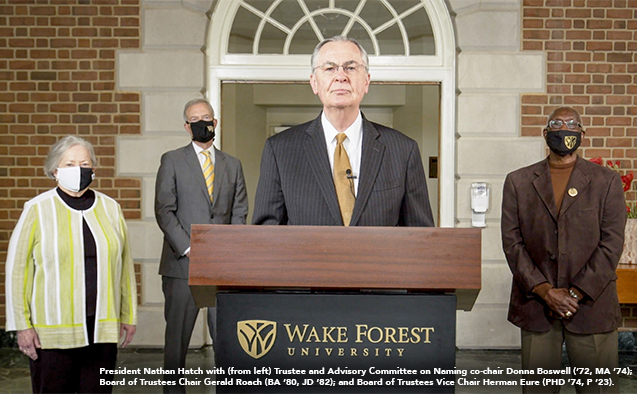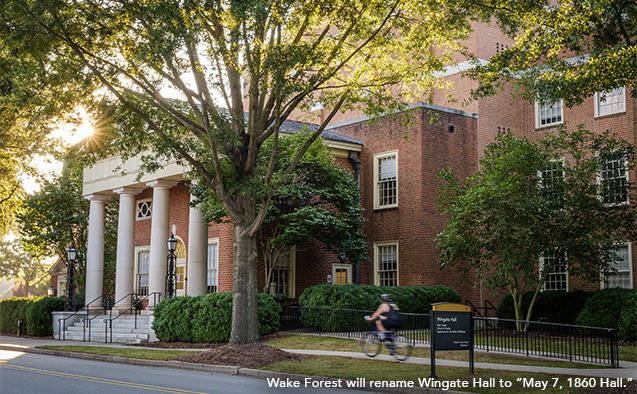Wake Forest University addresses its antebellum history
Wingate Hall renamed “May 7, 1860 Hall”; memorial planned

In a message to the Wake Forest University community, President Nathan O. Hatch announced steps the University is taking to address its antebellum history and affirm the humanity of all individuals.
Wake Forest will rename Wingate Hall to “May 7, 1860 Hall.” May 7, 1860, is the date Wake Forest sold at auction 16 human beings that a slave-owning benefactor bequeathed to the institution through his estate. By renaming this building, the University acknowledges participation in slavery, recognizes this aspect of its history and remembers those who labored at the institution against their will.
The University will also launch a process to establish a memorial affirming the humanity and dignity of those previously not remembered or honored in Wake Forest’s antebellum history.
“At Wake Forest, we are passionate about seeking knowledge and pursuing truth. The calling of Pro Humanitate is to use that knowledge and truth to better the lives and communities around us. Today, that community is our own.” Hatch said in the email. “These actions do not address the full story of Wake Forest’s history, but are the principal way the University intends to come to terms with its antebellum heritage.”
Washington Manly Wingate was the fourth president of Wake Forest University, serving from 1853-1862 and after the Civil War from 1866 until his death in 1879. Wingate contributed to the success of Wake Forest while actively promoting the institution of slavery. The decision to rename Wingate Hall was approved by the University’s Board of Trustees after careful consideration and extensive research on Wingate.

Hatch’s email made clear that Wait Chapel, named for founder Samuel Wait, will remain unchanged. “In leaving the Wait name on the chapel that shares a foundation with the newly named May 7, 1860 Hall, we acknowledge the inherent contradictions that summon our intellect and moral conviction,” Hatch wrote. “The complexity and contradictions create a tension that invites engagement with our story and the people whose lives are remembered and honored.”
The planned memorial will help address this tension and tell the story of May 7, 1860. It will offer a context for the record of Samuel Wait as the founder of the University who had enslaved persons serving his household.
Last summer, Wake Forest created the Advisory Committee on Naming, co-chaired by Trustee Donna Boswell and Divinity School Dean Jonathan Lee Walton, to establish guiding principles, conduct historical research and consider meaningful ways to contextualize, remember and honor individuals throughout Wake Forest’s story. Building on the work of the Slavery, Race and Memory Project, these efforts have widened the institution’s understanding of the context in which Wake Forest was founded and operated from 1834 through 1862.
This work represents the continuation of efforts started by the President’s Commission on Race, Equity and Community, which Hatch established in July 2019, and the Slavery, Race and Memory Project, which was created after Wake Forest joined Universities Studying Slavery (USS) in 2017, a consortium of colleges and universities that are examining the role slavery played on their campuses.
In the email, Hatch also invited people to participate in a 5 p.m. ceremony to recognize formerly enslaved individuals with ties to the University. The ceremony will be live streamed today and posted to the Expanding the Narrative site.
The Reading of the Names Ceremony was started by students in the University’s School of Divinity and its Sociology Department, who on May 7, 2019, gathered on the steps of Wait Chapel to remember the enslaved individuals who were sold by or worked for Wake Forest. Readers at today’s ceremony will include faculty, staff, students, administrators, alumni and a University trustee.
Categories: Inclusive Excellence, University Announcements
Wake Forest News
336.758.5237
media@wfu.edu
Meet the News Team
Headlines
Wake Forest in the News
Wake Forest regularly appears in media outlets around the world.




